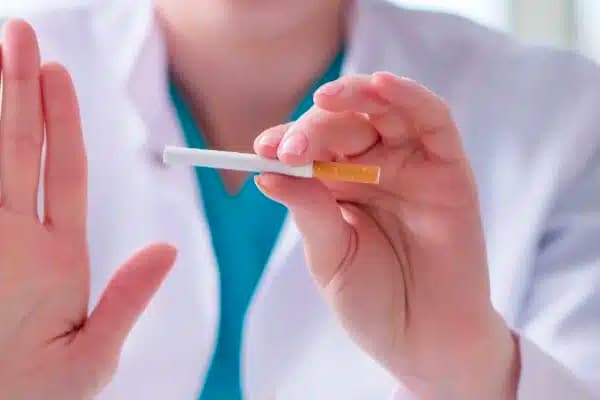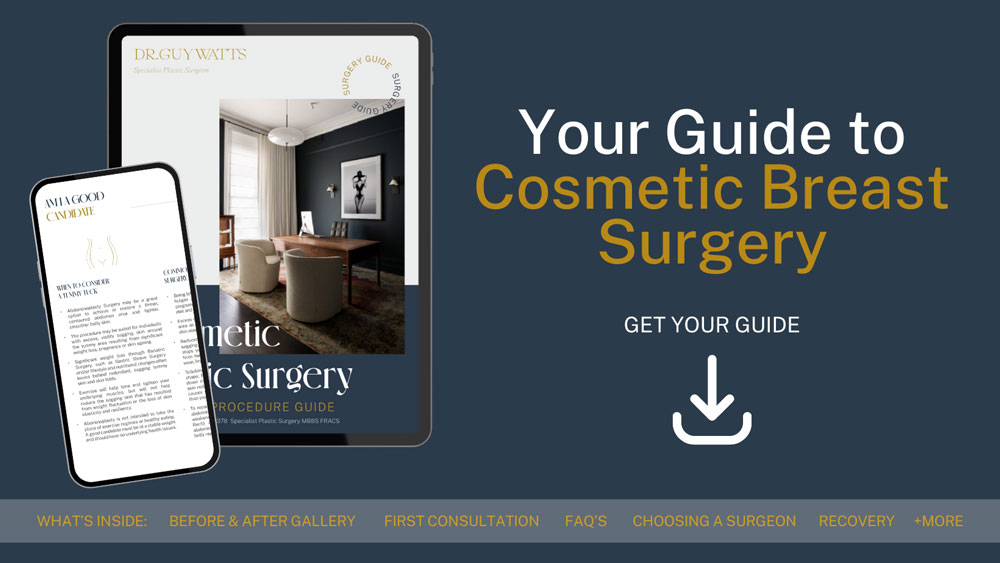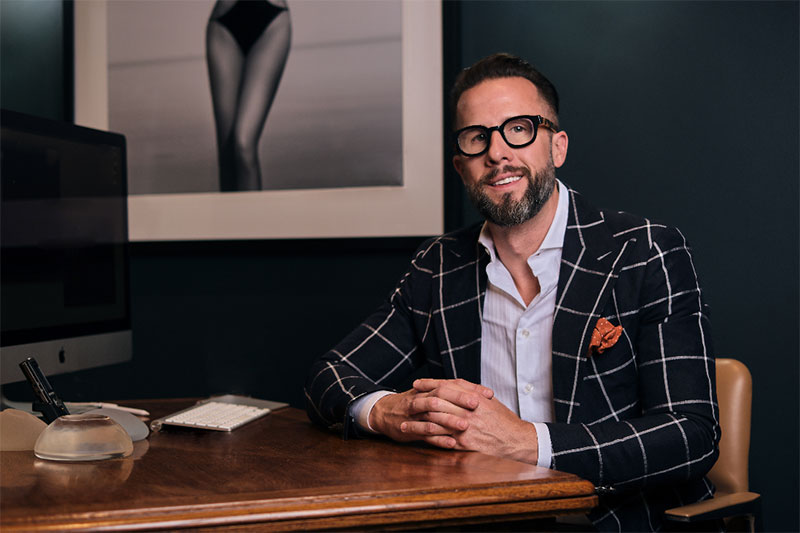
17 Jul 9 Reasons to Avoid Smoking Before and After Breast Surgery
Risks and Complications Associated with Smoking/Vaping Before and After Breast Surgery
Each year, thousands of people undergo breast surgery. Whether it’s for cancer treatment, reconstructive purposes, or cosmetic adjustments, the goal is a successful surgical outcome with less complications. It’s essential to know that smoking – both before and after your operation – can significantly impact this goal. In this blog we will discuss nine reasons why you should avoid smoking and vaping when preparing for, and recovering from, breast surgery.
Perth Specialist Plastic Surgeon Dr. Guy Watts has many years of experience performing breast procedures for patients wanting to augment, reduce or lift the breasts.
Take our quiz, and find out if you are ready for surgery
1. Impaired Blood Flow
When you smoke or vape, one of the many harmful effects it has on your body is impaired blood flow. Nicotine, a primary component of cigarettes, is a potent vasoconstrictor, meaning it causes your blood vessels to narrow. This constriction limits the amount of blood that can flow through your vessels. It’s akin to trying to push a large volume of water through a narrow pipe – the constriction makes a bottleneck, slowing down the flow.
In the context of breast surgery, this impaired blood flow can have significant consequences. The healing process after any surgery is heavily dependent on a good supply of oxygen and nutrients, both of which are carried in the blood. When blood flow is restricted, your tissues don’t receive the necessary oxygen and nutrients they need to heal properly. As a result, the healing process is slowed down, which can increase the risk of complications, such as wound dehiscence (the separation of a surgical incision or rupture of a wound closure), necrosis (death of body tissue), and infection.
Furthermore, impaired blood flow can also impact the results of your breast surgery, particularly if it’s a cosmetic procedure. Adequate blood supply is crucial for vital skin and tissue, both of which contribute to the final aesthetic outcome. Restricted blood flow can lead to skin changes, including discoloration and a loss of elasticity, which can affect the appearance of your breasts post-surgery.
2. Increased Risk of Infection
The risk of infection is a critical consideration in any surgical procedure, including breast surgery. As a smoker, this risk is dramatically increased. The reason for this heightened risk lies in the complex relationship between smoking, your immune system, and the body’s healing process.
When you smoke, the harmful chemicals you inhale have a systemic effect on your body, compromising its ability to defend itself against infections. Nicotine, along with other toxic compounds in cigarettes, impedes the function of various immune cells, reducing your body’s immune response. This means that your body is less equipped to fight off potential infections, making you more susceptible to postoperative complications.
Moreover, smoking causes constriction of your blood vessels, limiting the oxygen supply to your tissues. This limited oxygen supply, known as hypoxia, can further compromise your immune response. Oxygen plays a vital role in many cellular functions, including those of immune cells. With less oxygen available, these cells cannot function as effectively, reducing your body’s ability to ward off and control infections.
3. Delayed Wound Healing
An essential aspect of healing is wound closure, a delicate process that can be significantly delayed if you’re a smoker. The harmful substances found in cigarettes, such as nicotine, carbon monoxide, and hydrogen cyanide, can disrupt the wound healing process on a cellular level. This disruption can lead to an increased risk of wound dehiscence, the separation of wound edges, and more significant scarring.
Delayed wound healing not only prolongs your recovery period but also increases your risk of other complications, like infections and necrosis. The open wound can serve as an entry point for bacteria, resulting in infections that can further delay healing and potentially result in life-threatening conditions. Moreover, poor wound healing can negatively impact the cosmetic outcome of your breast surgery, meaning more visible scars and uneven healing. By quitting smoking before your breast surgery, you can significantly support your body’s healing processes, reduce the risk of complications, and support your overall recovery experience.
4. Compromised Lung Function
Smoking has long been linked to a range of respiratory issues, including chronic obstructive pulmonary disease (COPD), lung cancer, and reduced lung function. These lung complications can pose significant challenges if you’re preparing for a surgical procedure such as breast surgery. Compromised lung function can increase the risk of postoperative complications, particularly those related to your respiratory system.
After your breast surgery, your body will be in a state of recovery and healing, which requires a good supply of oxygen to function efficiently. Damaged lungs have a reduced capacity to take in and distribute oxygen throughout your body, hindering the healing process. More than this, poor lung function can increase your risk of developing postoperative pneumonia and other respiratory complications.
DOWNLOAD DR WATTS’ GUIDE TO COSMETIC BREAST SURGERY

5. Higher Risk of Anaesthetic Complications
As a smoker, you’re at a higher risk of developing complications related to anaesthesia. Smoking can cause or exacerbate conditions like chronic obstructive pulmonary disease (COPD) and heart disease, which can complicate the administration and management of anaesthesia.
These complications can include difficulties in managing airways, an increased risk of bronchospasm, and problems with oxygenation during surgery. These complications can make your surgery riskier and potentially affect the overall surgical outcome.
6. Negative Impact on Cosmetic Outcomes
Many individuals who opt for breast surgery, whether for reconstruction or cosmetic alterations, do so with a clear vision of their desired outcome. However, if you’re a smoker, the aesthetic results you’re hoping for could be negatively impacted. This is due to the detrimental effects of smoking on the body’s healing processes and the health of the skin and underlying tissues.
Firstly, smoking reduces the blood supply to the skin, which can lead to a dull, sallow complexion and a loss of elasticity. This can affect the condition and appearance of your skin after surgery, potentially impacting the final aesthetic result. Additionally, as we’ve discussed earlier, smoking can delay wound healing and increase the risk of scarring, both of which can affect the cosmetic outcome of your surgery. Poorly healed wounds and visible scarring can lead to dissatisfaction with the surgery results, even if the procedure itself was successful.
7. Increased Risk of Capsular Contracture
Capsular contracture is a potential complication following Breast Augmentation surgery. It happens when the scar tissue that forms around the breast implant contracts, causing the breast to feel hard, appear distorted, and sometimes causing discomfort or pain. Research has indicated that smoking increases the risk of developing capsular contracture, likely due to its negative effects on the body’s healing processes and immune response.
Nicotine constricts the blood vessels, impairing the delivery of oxygen and nutrients to the healing tissues. This impairment can lead to the formation of thicker, less flexible scar tissue, which is more likely to contract around the implant. More than this, as smoking compromises the immune system, it can increase the inflammatory response, which is also believed to contribute to capsular contracture.
8. Prolonged Recovery Period
The recovery period is the time it takes for your body to heal and for you to regain function after surgery. If you smoke, your recovery period can be significantly prolonged. This is due to several factors, including impaired healing, increased risk of complications, and compromised lung function, all of which we’ve previously discussed.
A longer recovery period can mean more time away from work or regular activities, and it can also increase the emotional and psychological burden of the surgical process. It can also mean more follow-up appointments and treatments to manage any complications or issues that arise, adding to the overall cost of the surgery. By quitting smoking, you can give your body the highest chance to heal optimally, potentially reducing your recovery period and getting you back to your routine faster.
9. Higher Healthcare Costs
The financial implications of smoking, particularly in the context of surgical procedures like breast surgery, can be substantial. Smoking increases the risk of complications both during and after surgery, which can lead to extended hospital stays, additional treatments, and possible reoperations. Each of these factors contributes to increased healthcare costs.
Consider, for example, the increased risk of infection in smokers. An infection following surgery can require a prolonged hospital stay for intravenous antibiotics or even additional surgery to address the infection. This significantly increases the cost of what might have been a routine procedure. Similarly, the potential for delayed wound healing can necessitate additional follow-up visits and treatments, adding to the overall expense.
FAQs about Smoking and Plastic Surgery
When should I quit smoking before my plastic surgery?
- Dr Watts will advise you to quit smoking at least four to six weeks before your surgery.
- This allows your body time to start healing from the effects of smoking and increases blood flow to optimise healing post-surgery.
When can I resume smoking after breast surgery?
- It’s important to avoid smoking for as long as possible after your surgery, ideally never resuming.
- If you must, it is generally recommended to wait at least four weeks after surgery. However, remember that resuming smoking can still negatively impact your healing and overall health.
Is it really dangerous to smoke right after plastic surgery?
- Yes, it is dangerous to smoke right after plastic surgery. Smoking impairs your body’s ability to heal, increases the risk of complications such as infection and blood clots, and can negatively impact the aesthetic results of your surgery.
Can I get breast surgery if I can’t stop smoking?
- While it’s possible to get breast surgery if you can’t stop smoking, it’s not recommended.
- Smoking increases the risks associated with surgery and can impair your recovery and the results of your surgery.
- It’s crucial to discuss this with Dr. Watts, who can provide advice tailored to your specific circumstances.
Will the plastic surgeon know that I smoked before the surgery?
- Plastic surgeons can often tell if a patient has been smoking based on certain physical signs and symptoms. Furthermore, it’s essential to be honest with Dr. Watts about your smoking habits. They need this information to properly assess your risks and plan your care.
Further Reading about Breast Surgery with Dr. Guy Watts
- Read Dr. Guy Watts’ Breast Augmentation Surgery Page
- Read Dr. Guy Watts’ Breast Reduction Surgery Page
- Read Dr. Guy Watts’ Breast Lift Surgery Page
- See Dr. Guy Watts’ Breast Implants Gallery
- Read Dr. Guy Watts’ Blog about What causes Breast Ptosis
Medical References about Smoking and Breast Surgery
About Dr. Guy Watts – MED0001539378
FRACS (Plas) – Specialist Plastic Surgeon In Perth WA
Dr. Guy Watts is a Specialist Plastic Surgeon (AHPRA MED0001539378) with an extensive career that spans across renowned plastic surgery clinics worldwide. His experience has been honed through invaluable experiences at esteemed establishments such as the New York Eye and Ear Infirmary and the renowned Pitanguy Clinic in Brazil.
Having collaborated with the foremost cosmetic plastic surgeons on a global scale, Dr. Watts has chosen to return to Perth after a 17-year journey of intensive training and invaluable professional experience to bring the latest practices and technology in cosmetic plastic surgery to his patients.
Dr. Watts is a Fellow of the Royal Australasian College of Surgeons (FRACS) and a Member of the Australian Society of Plastic Surgeons (ASPS), Australasian Society of Aesthetic Plastic Surgeons (ASAPS) and the International Society of Aesthetic Plastic Surgeons (ISAPS).
Read about the potential Risks and Complications of Surgery
Read the Patient Information and Resources
About CLINISPA
Clinispa is Dr Watts’ bespoke medical clinic performing Cosmetic Aesthetic treatments. At Clinispa, we offer advanced clinical treatments in a luxurious and calming environment, tailored to support your skin’s health and appearance.
Clinispa aesthetic services are performed by Dr Guy Watts’ nursing professionals, who have a passion for and solid understanding of facial aesthetics.
All Clinispa clients are considered individually, with a personalised treatment plan consisting of advanced scientific approaches to cosmetic aesthetics. We incorporate innovative technologies in conjunction with superiorly formulated skin care.
For more information about the full range of Clinispa Aesthetic of Cosmetic Treatments visit the Clinispa website








Sorry, the comment form is closed at this time.